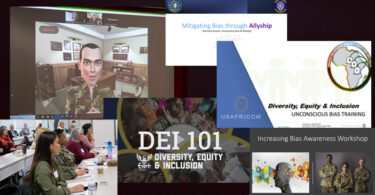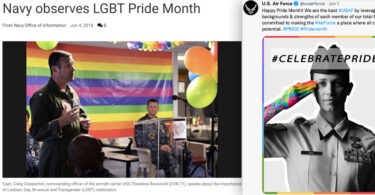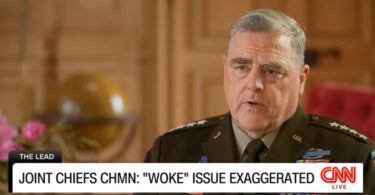By Lawrence Purdy, USNA ’68
In 2003, Supreme Court Justice Clarence Thomas wrote:
The Constitution abhors classifications based on race, not only because those classifications can harm favored races or are based on illegitimate motives, but also because every time the government places citizens on racial registers and makes race relevant to the provision of burdens or benefits, it demeans us all. Purchased at the price of immeasurable human suffering, the equal protection principle reflects our nation’s understanding that such classifications ultimately have a destructive impact on the individual and our society.1
Two important cases that may affect our military currently await decisions by the United States Supreme Court. Each case involves the use of racial preferences in admissions at well-known institutions of higher learning: Harvard College and the University of North Carolina, respectively.2
Among the numerous amicus curiae (“Friend of the Court”) briefs filed in both cases is one that names thirty-five individuals, thirty-three of whom are senior retired military officers.3
Claiming a national security interest that thoroughly ignores Justice Thomas’s aforementioned observations, these retired officers support the continued use of racially discriminatory admissions policies4 at the defendant institutions. They also ask the Court to bless the use of these policies at our Nation’s service academies and at other colleges and universities that offer federally funded Reserve Officers’ Training Corps (ROTC) programs.5
What is entirely unacknowledged by these retired officers is that these racially discriminatory policies constitute a direct violation of the fundamental promise of equal opportunity owed to every member of our military.
In their brief, the retired officers characterize the late Secretary of State and retired U.S. Army General Colin Powell as a supporter of racial preferences (undoubtedly based on the fact that he is named in similar briefs in support of racial preferences at the University of Texas).6 The retired officers further claim that “Secretary Powell’s rise through the ranks was made possible in part by the race-conscious policies” they support.7
This last claim is a particularly odd one to make. Long-time admirers of Colin Powell do not share the view that his “rise through the ranks” was due to racial preferences. Nor, if his own words are to be believed, did Powell himself believe it. Proof of the latter comes from his 1995 autobiography, wherein he expressed a decidedly negative view of preferential treatment in the military and emphasized that his support for affirmative action8 depended entirely upon how the phrase was defined:
The debate over affirmative action has a lot to do with definitions. If affirmative action means programs that provide equal opportunity, then I am all for it. If it leads to preferential treatment . . . I am opposed. I benefited from equal opportunity and affirmative action in the Army, but I was not shown preference . . . Affirmative action in the best sense promotes equal consideration, not . . . discrimination. Discrimination ‘for’ one group means, inevitably, discrimination ‘against’ another; and all discrimination is offensive.9
Powell was right, and racial discrimination is especially offensive in our military, where combatting discrimination and ensuring equal opportunity are “absolutely indispensable to unit cohesion and therefore critical to military effectiveness and our national security.”10 What prompted Powell to lend his name to the retired officers’ briefs in the University of Texas case is unknown; but the racially discriminatory policies being promoted in those briefs, like the policies being challenged in the Harvard and UNC cases, are irreconcilable with the views he expressed in his autobiography.
“Diversity” and Equal Opportunity
To be sure, equal opportunity in the U.S. military has had a long, if uneven, history. Although it officially began in 1948 when President Harry S. Truman issued an executive order desegregating our military,11 it took twenty years before the Department of Defense (DOD) issued its first Human Goals Charter explicitly recognizing the importance of diversity.12
As outlined in a 2011 report prepared by the congressionally created Military Leadership Diversity Commission (MLDC), “diversity” (however the word is defined) was viewed by those Americans who grew up in the civil rights era as simply another name for equal opportunity programs.13
Unfortunately, the military’s transition from equal opportunity to race-conscious decision-making was signaled when this same Commission shockingly concluded that “although good diversity management rests on a foundation of fair treatment, it is not about treating everyone the same.”14 Color-blindness was openly discouraged while “leveraging” racial differences was encouraged.15 It was, and remains, a destructive detour from Dr. King’s vision of a nation where only character, and not skin color, should matter.16
A better melding of diversity with equal opportunity was described in a 2010 Wall Street Journal editorial written by a highly distinguished public servant, decorated Marine Corps combat veteran, and fellow member of the United States Naval Academy’s class of 1968:
Nondiscrimination laws should be applied equally among all citizens, . . . Our government should be in the business of enabling opportunity for all, not in picking winners. It can do so by ensuring that artificial distinctions such as race do not determine outcomes.17 – United States Senator Jim Webb (D-VA)
Notwithstanding the MLDC’s obsession with race, DOD’s purportedly longstanding public commitment to equal opportunity, consistent with Senator Webb’s views, could later be found in an April 2014 revised version of the “Department of Defense Human Goals Charter.”18 This rarely publicized document was signed by President Obama’s Secretary of Defense; the Secretaries of the Army, Navy, and Air Force; and every member of the Joint Chiefs of Staff19 (none of whom are named as amici in the retired officers’ brief).20 The 2014 DOD Charter opened with these words:
OUR Nation was founded on the principle that the individual has infinite dignity and worth. The Department of Defense, which exists to keep the Nation secure and at peace, must always be guided by this principle . . . 21
Its goals included:
TO make military service . . . a model of equal opportunity for all regardless of race, color, sex, religion, sexual orientation, or national origin.22
When combined with the fundamental principle prohibiting racial discrimination in public education, as unanimously declared by our Supreme Court nearly seven decades ago in Brown v. Board of Education,23 these statements emphasize the importance of military leaders faithfully adhering to policies that do not condone racial discrimination against any individual.
Indeed, the men and women who today enter our service academies and federally funded ROTC programs, and who otherwise volunteer to serve our country in uniform, have a right to expect that their treatment will at all times be based on Brown’s unconditional color-blind principle, as affirmed in Title VI of the Civil Rights Act of 1964.24
—
Mr. Purdy is a 1968 graduate of the United States Naval Academy and a veteran of the Vietnam War. As a lawyer in private practice, he was a member of the pro bono trial and appellate team that litigated the University of Michigan race-preference admissions lawsuits on behalf of the plaintiffs Barbara Grutter and Jennifer Gratz.
First published on Minding The Campus
Minding the Campus aims to expose the intellectual conformity at today’s universities and find solutions to the academic totalitarianism that silences dissenters.
1 Justice Thomas (concurring in part and dissenting in part), Grutter v. Bollinger, 539 U.S. 306, 353 (2003) (citations and internal quotes omitted) (emphasis added).
2 Students for Fair Admissions, Inc. v. President and Fellows of Harvard College (No. 20-1199); and Students for Fair Admissions, Inc. v. University of North Carolina, et al. (No. 21-707).
3 Brief of ADM Charles S. Abbot, Et Al., as Amici Curiae in Support of Respondents (“retired officers’ brief”). Three of the “senior retired officers” who support the use of racial preferences at Harvard College and the University of North Carolina are my United States Naval Academy classmates (Class of 1968): Navy Admirals Dennis Blair and Michael Mullen; and Marine Corps General Charles Bolden, Jr. This is not the first time I have responded to the pro–racial preferences positions previously taken by two of them (Admiral Blair and General Bolden) in the 2003 version of a similar retired officers’ amicus brief filed in Gratz, et al. v. Bollinger, 539 U.S. 244 (2003); and Grutter v. Bollinger, 539 U.S. 306 (2003). See, R. Lawrence Purdy, “Operation Racial Preferences: What the U. S. military doesn’t need,” National Review Online (May 28, 2003): https://www.nationalreview.com/2003/05/operation-racial-preferences-r-lawrence-purdy/.
4 The retired officers’ brief euphemistically characterizes these racially discriminatory policies as “the continuing modest use of race-conscious policies.” Id., at 32.
5 Id., at 31.
6 See Br. of Lt. Gen. Julius W. Becton, Jr., et al., Fisher v. Univ. of Tex. at Austin, 570 U.S. 297 (2013) (No. 11-345) (“Fisher I”); and 579 U.S. 365 (2016) (No. 14-981) (“Fisher II”).
7 Retired officers’ brief, supra note 3, at 20. Note: The pro–racial preferences position advocated by the retired officers is strongly opposed by a different and highly distinguished group of military veterans, Veterans for Fairness and Merit (VFM). In contrast to the thirty-five individuals named in the retired officers’ brief, VFM’s membership consists of literally hundreds of former members of all branches of the United States military, including a wide range of enlisted men and women as well as members of all officer ranks, including 119 general/flag officers. Among VFM’s members are twenty-one recipients of the Medal of Honor and hundreds of recipients of other decorations for combat valor (including Distinguished Service, Navy, and Air Force Crosses, 142 Silver Stars, 212 Bronze Star Medals with combat “V” devices, and 215 Purple Hearts for wounds received during combat). See Br. of Veterans for Fairness and Merit as Amicus Curiae Supporting Petitioner (Nos. 20-1199 & 21-707), at 1-2.
8 “Affirmative action” was a phrase originally conceived by President John F. Kennedy in a 1961 executive order: “WHEREAS discrimination because of race, creed, color, or national origin is contrary to the Constitutional principles and policies of the United States; . . . The contractor will take affirmative action to ensure that applicants are employed, and that employees are treated during employment, without regard to their race, creed, color, or national origin.” See, Exec. Order No. 10925, 3 CFR 448 (1961), signed by President Kennedy on Mar. 6, 1961 (emphasis added). President Kennedy’s explicit intent was to remove—not add—race as a factor in government employment and contracting, and to take “affirmative action” to ensure racial discrimination did not occur.
9 Colin Powell, My American Journey (1995), at 591–592 (emphasis added).
10 See Br. of Lt. Gen. Julius W. Becton, Jr., et al. as Amici Curiae in both Gratz and Grutter (discussed supra note 3). This observation was made not once but twice by the retired officers in their amicus brief in Gratz and Grutter. See id, at 12 and 17. Thereafter these observations were quietly ignored and forgotten, lost in the retired officers’ support for the University of Michigan’s racially discriminatory admissions policies.
11 President Truman’s Executive Order 9981 (Jul. 26, 1948): “It is hereby declared to be the policy of the President that there shall be equality of treatment and opportunity for all persons in the armed services without regard to race, color, . . . or national origin.”
12 Military Leadership Diversity Commission final report, From Representation to Inclusion: Diversity Leadership for the 21st Century Military (MLDC Final Report), delivered to President Barack Obama on Mar. 15, 2011, at 27–29. See following link to MLDC Final Report: https://www.hsdl.org/c/abstract/?docid=11390.
13 Id., at 11.
14 Id., at 18 (emphasis added).
15 Id.
16 Coretta Scott King (ed.), The Words of Martin Luther King, Jr. (1983), at 95: “I have a dream that my four little children will one day live in a nation where they will not be judged by the color of their skin but by the content of their character.”
17 James Webb, “Diversity and the Myth of White Privilege,” Wall Street Journal (Jul. 23, 2010) (emphasis added).
18 Steven Hoarn, “Revised Department of Defense Human Goals Charter Disseminated Far and Wide,” Defense Media Network (Jun. 8, 2014).
19 Id. The 2014 version of the Human Goals Charter was signed by President Obama’s Secretary of Defense, Chuck Hagel. Other signatories included the Secretary of the Army, John McHugh; Secretary of the Navy, Ray Mabus; Secretary of the Air Force, Deborah James; Chairman of the Joint Chiefs of Staff, Army General Martin E. Dempsey; Army Chief of Staff, General Raymond Odierno; Chief of Naval Operations, Admiral Jonathan Greenert; Air Force Chief of Staff, General Mark A. Welsh III; and the Commandant of the Marine Corps, General Jim Amos.
20 Id. None of the living individuals who signed the 2014 version of the Human Goals Charter, guaranteeing equal opportunity without regard to race, are named as amici in the retired officers’ brief in the Harvard and UNC cases. (General Odierno passed away on October 8, 2021.)
21 Supra note 18.
22 Id. (emphasis added).
23 “[R]acial discrimination in public education is unconstitutional. All provisions of federal, state, or local law requiring or permitting such discrimination must yield to this principle.” Brown v. Bd. of Educ., (“Brown II”), 349 U.S. 294, 298 (1955) (emphasis added).
24 42 U.S.C. sec. 2000d (2006): “No person in the United States shall, on the ground of race, color, or national origin, be excluded from participation in, be denied the benefits of, or be subjected to discrimination under any program or activity receiving Federal financial assistance.”








Leave a Comment